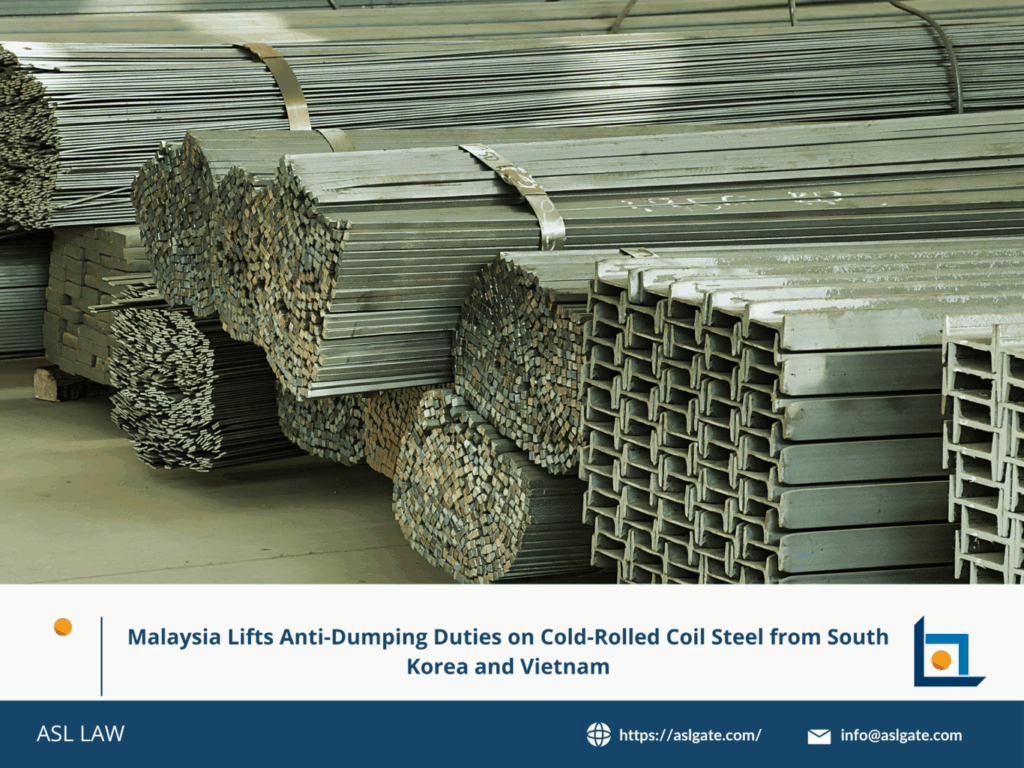On June 21, 2025, Malaysia’s Ministry of Investment, Trade and Industry (MITI) announced the final determination of its sunset review concerning the anti-dumping duties imposed on imports of cold-rolled coil (CRC) or non-alloy steel with a width of more than 1,300 mm originating from China, Japan, South Korea, and Vietnam. This marks a key step in reassessing the effectiveness of previously imposed trade remedy measures.
The decision to terminate duties resulted from a thorough evaluation of the likelihood of continued dumping, actual injury to the domestic steel industry, and broader public interest. MITI concluded that for imports from South Korea and Vietnam, the existing anti-dumping duties were no longer justified and decided to revoke the measures, effective from June 23, 2025.
In contrast, MITI determined that anti-dumping duties would remain in place for similar products from China and Japan for another five-year period, from June 23, 2025, to June 22, 2030. The duty rates for China range from 4.76% to 26.38% depending on the exporter, while Japan is subject to a fixed rate of 26.39%.
From a legal standpoint, MITI’s decision is grounded in Malaysia’s Anti-Dumping and Countervailing Duties Act 1993 and its implementing regulations. The sunset review process strictly adhered to WTO guidelines and domestic legal procedures, including the requirement for five-year reassessment of applied duties.
In practical terms, the removal of tariffs presents a clear market opportunity for South Korean and Vietnamese steel producers, removing tariff barriers in the Malaysian market and improving their competitiveness relative to Chinese and Japanese exporters who remain subject to high duties. This outcome also offers valuable precedent for Vietnamese businesses seeking to engage in and benefit from future sunset reviews to request the removal of trade remedy measures in other jurisdictions.
For Vietnamese exporters, it is important to closely monitor MITI’s announcements and non-confidential documentation to stay updated on the legal status of the decision. At the same time, companies should strengthen their documentation demonstrating product competitiveness, origin, and lawful sales practices to prepare for potential re-initiation of trade remedy investigations.
In conclusion, Malaysia’s decision to lift anti-dumping duties on cold-rolled coil steel from Vietnam and South Korea is a strategic move based on comprehensive legal and economic assessment in line with both international and domestic regulations. Businesses in both countries should see this as a positive development to reinforce their competitive position and proactively engage with relevant review mechanisms in the future.
To protect their legitimate interests, manufacturers and exporters should familiarize themselves with the procedure and actively contact Vietnam Antidumping Law Firm specializing in anti-dumping and trade remedy for timely assistance.
ASL Law is a leading full-service and independent Vietnamese law firm made up of experienced and talented lawyers. ASL Law is ranked as the top tier Law Firm in Vietnam by Legal500, Asia Law, WTR, and Asia Business Law Journal. Based in both Hanoi and Ho Chi Minh City in Vietnam, the firm’s main purpose is to provide the most practical, efficient and lawful advice to its domestic and international clients. If we can be of assistance, please email to [email protected].
ASL LAW is the top-tier Vietnam law firm for Anti-dumping & countervailing. If you need any advice, please contact us for further information or collaboration.

 Tiếng Việt
Tiếng Việt 中文 (中国)
中文 (中国) 日本語
日本語

